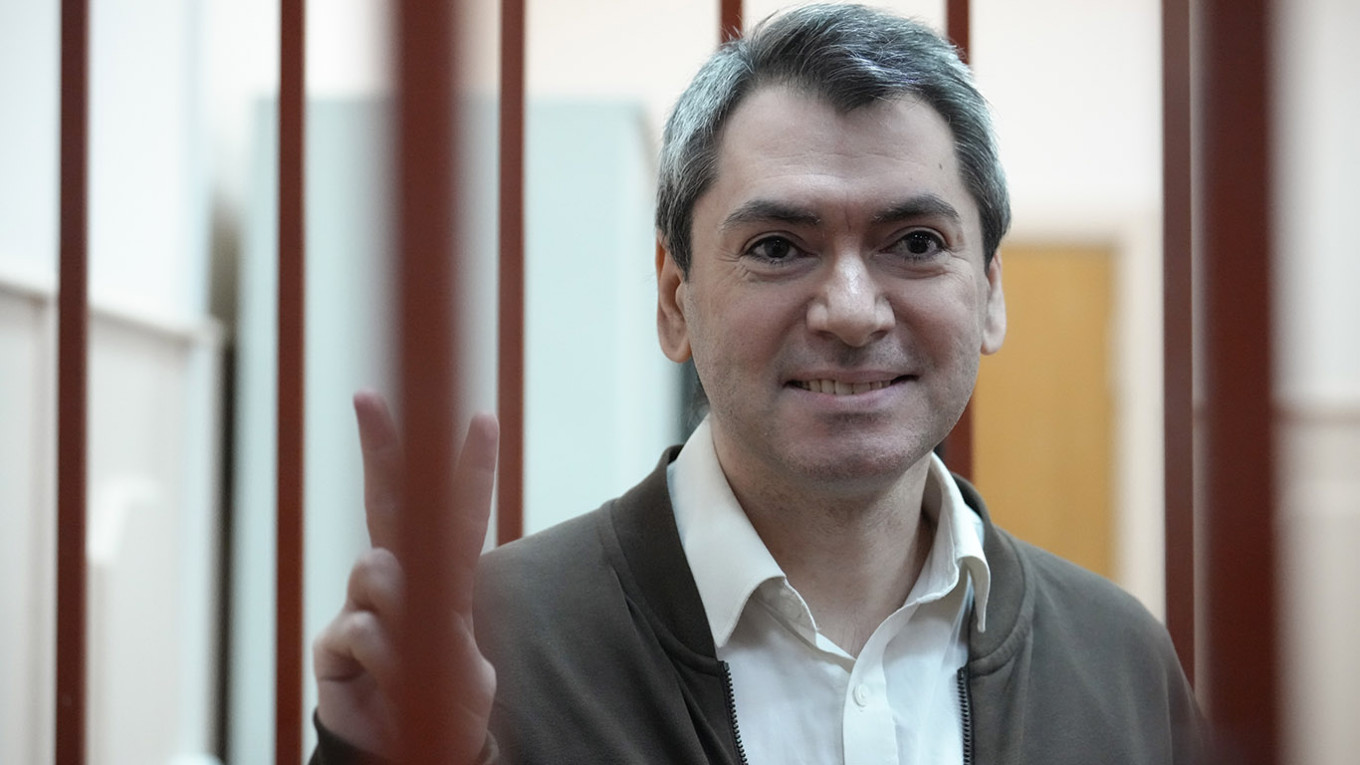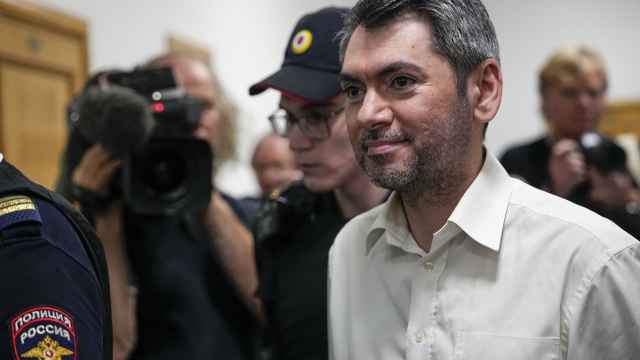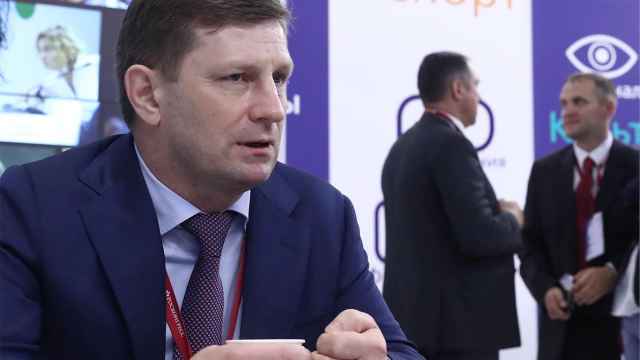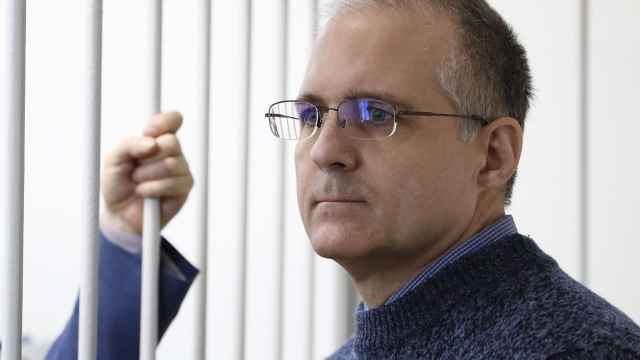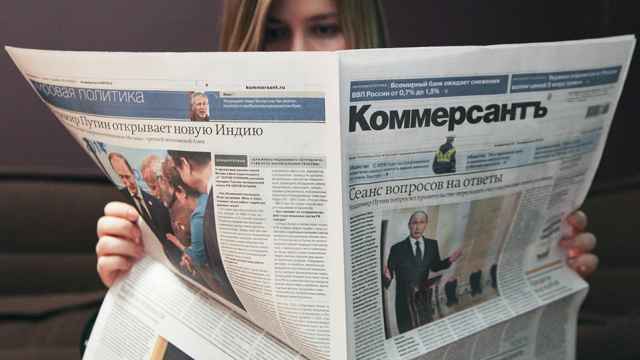Grigory Melkonyants, the co-chair of the leading independent election monitor Golos, was sentenced to five years in prison on charges of running an “undesirable” organization on Wednesday.
Melkonyants, 44, was accused of working with the European Network of Election Monitoring Organizations (ENEMO), a charge he denies.
Ahead of his sentencing, The Moscow Times translated and republished his final word in court:
Your Honor, esteemed participants of the proceedings, dear friends,
Today is a joyous day for me. As we near the end of this trial, I feel grateful. It has been an exhilarating experience. I’ve listened to heartfelt, sometimes emotional words from people who testified as witnesses, read warm letters and received amazing postcards. At times, it felt like a real celebration — as if I were the guest of honor at a party, not the defendant in a criminal case.
Twenty-one months ago, on Aug. 17, 2023, a new and unexpected chapter of my life began. Since then, I’ve gone through a search, arrest, a temporary detention facility, three pre-trial detention centers, 12 cells, more than 100 cellmates and 26 court hearings. I value this experience deeply because it came at a high cost. But most importantly, it allowed me to reflect on my life and learn about a world I hadn’t paid enough attention to before.
I’ve seen how prison destroys people’s lives, stripping away their joy — and therefore, their happiness. Because the joy of living is real happiness.
Don’t be surprised by the word “joy.” You may ask, what could possibly be joyful in my situation, in the darkness of incarceration, where I go months without seeing my family, friends or colleagues? But it’s precisely through this hardship that I’ve grown stronger and have not lost faith in the cause to which I’ve devoted my life.
In prison, I’ve met people I likely never would’ve crossed paths with otherwise — people with all kinds of backgrounds, education levels and criminal charges. Every day, we have to figure out how to live alongside one another: how to assign chores, when to air out the cell, where to find a kettle or a fridge. Essentially, we’re constantly holding little referendums and reaching consensus.
The fact that I am an optimist has helped me tremendously. I always try to find something good in every situation and to support those around me. In this way, my outlook is like that of a character from a novel, the orphan girl Pollyanna. Her father, a minister, taught her the “glad game,” a way of finding something to be happy about in every circumstance. She passed that game on to everyone she met. It’s not about denying your problems, but rather choosing to look for solutions and draw meaningful lessons from them.
I encourage you to try playing the “glad game” too. After all, each of us only truly has this present moment. There is no other time to live but right now. It doesn’t matter where you are: in your homeland or a foreign country, on vacation or at work, in your apartment or stuck in traffic, at a polling station or in a prison cell — this moment, right now, is all we have. That’s why it’s called “the present.” And we should live it with joy and intention.
So, for me — both as a person and as a lawyer — this time in prison has been incredibly fruitful. I’ve started drawing, making collages and crafts and writing poems. I’ve gained a new perspective on people, relationships and systems.
I’ve learned to find joy in the flow of life, in work, in creativity, in intellectual freedom. Because while you can imprison a person, you cannot imprison a thought. You can’t stop it. You can’t take it away. You can’t erase my past or what was and still is my world. It might sound boring to some, but without fair laws, transparent procedures and respect for the rule of law, the kind of society we all dream of simply can’t exist. I think about this constantly, and I know I’m not alone. What we have in common is a shared determination to think critically and to do our small part to make the world a better place.
But let’s talk about joy from another angle. Can you really feel true joy from deception? From fabricating evidence? From prosecuting an innocent person? Where’s the joy in pursuing my case — a case that should have fallen apart in the earliest stages of the investigation? A case no one wanted to open, that got passed from one agency to another? A case built not on facts but on assumptions and ignorance of basic civil, administrative and criminal law? A case that has seen eight different investigators? This pursuit of injustice drains the joy out of everyone involved.
Still, I don’t harbor any resentment toward anyone. The ability to forgive and let go of the bad, even when you feel like you don’t have it in you, transforms forgiveness into one of life’s most joyful moments.
Your Honor,
The investigators have engineered a unique situation. For the first time in our country’s history, they want to declare the assembly hall of the Central Election Commission a crime scene — and an expert invited to speak there a criminal.
As a lawyer, I don’t understand why I’m here and why I am a defendant in this case. And most of all, I don’t understand why I’m the one having to prove my innocence, rather than the prosecution proving my guilt, as Article 49 of the Russian Constitution requires. There is no evidence that a crime ever took place. And yet I’ve been forced to prove a negative: that the Golos movement is not a structural subdivision of the international organization ENEMO, which has been labeled “undesirable” in Russia, and that I was not involved in organizing ENEMO’s activities by speaking at a Central Election Commission roundtable.
In the end, it was state authorities — and stubborn facts — that helped prove my innocence. The first response from the Justice Ministry confirmed that ENEMO has no branches in Russia. The second confirmed that Golos has never been declared “undesirable,” nor has any court or government agency ever banned or restricted Golos’ work. And finally, the fact that ENEMO and Golos are two entirely separate organizations is confirmed by the fact that they appear in two different official registries: ENEMO on the list of “undesirable” organizations, and Golos on the list of so-called “foreign agents.”
In other words, the entire prosecution is built on baseless and misleading information from operational officers, which has no evidentiary value, and on a fabricated narrative that distorts the documents in the case file.
And this is exactly where the constitutional principle must apply: that any irresolvable doubt must be interpreted in favor of the defendant. This principle should lead to an acquittal. Yes, in today’s Russia, acquittals make up just 0.26% of verdicts — but they do happen. Sometimes, judges do follow the law and acknowledge that guilt is not a given.
Friends,
I am a citizen of Russia. I love my country, and I value my constitutional rights and freedoms very much. I’m grateful to our forefathers for fighting for them. These rights and freedoms may seem ordinary now, but in prison, you realize that it’s not enough to win them with blood, sweat and tears — they must be defended, again and again.
That’s why I’ve found real joy in working on proposals to implement electoral rights inside pre-trial detention facilities — things like how a prisoner in isolation can sign a petition in support of a candidate’s nomination; how to donate to a campaign fund; how to receive campaign materials; how to verify a prisoner’s identity when receiving a ballot; how to ensure voting from outside one’s registered district; and how to organize election monitoring in detention facilities. These things matter, because pre-trial detainees retain their full voting rights until a final conviction. But that’s often forgotten. Over these months of close observation and reflection, I’ve found many workable solutions.
I don’t know how long my imprisonment will last, but I am certain that one day I’ll be freed and reunited with my loved ones and friends. That thought alone fills me with joy. I’m grateful that even from prison, I can speak to my mother, correspond with kind people, meet with my legal team and continue doing the work I believe in.
Of course, I worry about the future of Golos, the movement to which I’ve devoted 12 years of my life. I don’t know what will happen to it after this verdict. But I do know this: over the years, hundreds of thousands of honest, capable people have become election observers. They haven’t sat idly by while I’ve been behind bars. They’ve carried on our work across nearly 9,000 elections in Russia. That’s an extraordinary example of civic initiative and public service. And I am proud to be part of that community.
Some may wonder: Is it even possible to have honest elections? Is it worth taking part at all? These are valid questions. But in moments of doubt, we should not forget that humans are not perfect, and so elections are not perfect either. All the human vices that we struggle with all our lives are manifested during elections. Every day, each of us makes a choice — between kindness and cruelty, love and hatred, loyalty and betrayal, strength and weakness, generosity and greed, truth and lies, optimism and apathy, humility and pride, sincerity and self-interest, engagement and indifference.
Choosing what’s right, increasing honesty and common sense — this is our path forward. Elections won’t become fair on their own. People make them fair. Happy people. So watch, get involved, find more joy in life. And step by step, drop by drop, day by day, raise the level of honesty and reason in our society.
Thank you for listening to me so patiently. Finally, from the bottom of my heart, I want to thank my family, my legal team, my colleagues and all the kind people who have supported me and made sure I haven’t had to face this injustice alone. Your support tells me that what I’ve done matters to people. And that all of this was not in vain.
Thank you!
A Message from The Moscow Times:
Dear readers,
We are facing unprecedented challenges. Russia's Prosecutor General's Office has designated The Moscow Times as an "undesirable" organization, criminalizing our work and putting our staff at risk of prosecution. This follows our earlier unjust labeling as a "foreign agent."
These actions are direct attempts to silence independent journalism in Russia. The authorities claim our work "discredits the decisions of the Russian leadership." We see things differently: we strive to provide accurate, unbiased reporting on Russia.
We, the journalists of The Moscow Times, refuse to be silenced. But to continue our work, we need your help.
Your support, no matter how small, makes a world of difference. If you can, please support us monthly starting from just $2. It's quick to set up, and every contribution makes a significant impact.
By supporting The Moscow Times, you're defending open, independent journalism in the face of repression. Thank you for standing with us.
Remind me later.


